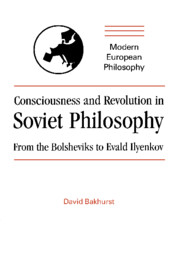Book contents
- Frontmatter
- Contents
- Acknowledgments
- A note on translation, transliteration, and references
- 1 Introduction
- 2 Deborinites, Mechanists, and Bolshevizers
- 3 Vygotsky
- 4 Lenin and the Leninist stage in Soviet philosophy
- 5 Ilyenkov and dialectical method
- 6 The problem of the ideal
- 7 The socially constituted individual: Rethinking thought
- 8 In conclusion
- References
- Index
7 - The socially constituted individual: Rethinking thought
Published online by Cambridge University Press: 10 December 2009
- Frontmatter
- Contents
- Acknowledgments
- A note on translation, transliteration, and references
- 1 Introduction
- 2 Deborinites, Mechanists, and Bolshevizers
- 3 Vygotsky
- 4 Lenin and the Leninist stage in Soviet philosophy
- 5 Ilyenkov and dialectical method
- 6 The problem of the ideal
- 7 The socially constituted individual: Rethinking thought
- 8 In conclusion
- References
- Index
Summary
The transformation of nature by human activity is the process of the idealization of the material world. In activity, human beings create and sustain an environment written through with significance; they nurture a world enriched with ideal properties, with value and meaning. This is the world we know. Indeed, only an idealized world can be known, for only such a world may be complemented by a subject able to reproduce it in thought and experience. In Marx's words:
Only through the objectively unfolded richness of man's essential being is the richness of subjective human sensibility … either cultivated or brought into being. For not only the five senses, but also the so-called mental senses, the practical senses (will, love, etc.), in a word, the human sense, the humanity of the senses, come to be by virtue of their object, by virtue of humanized nature. (Marx 1844: 103; quoted in Ilyenkov 1964b: 240)
On this view, the subjective and objective are not absolutely exclusive categories, but are unified by their common source in activity, which ever sustains their mutual opposition and interchange.
This, for Ilyenkov, is the essence of Marxism's solution to the problem of the ideal. As we have observed, Ilyenkov believes this solution has radical consequences for our understanding of the mind, leading us to reject the abstract philosophical subject of classical epistemology for a conception of the individual as a socially constituted being (see Chapters 5 and 6).
- Type
- Chapter
- Information
- Consciousness and Revolution in Soviet PhilosophyFrom the Bolsheviks to Evald Ilyenkov, pp. 217 - 258Publisher: Cambridge University PressPrint publication year: 1991



